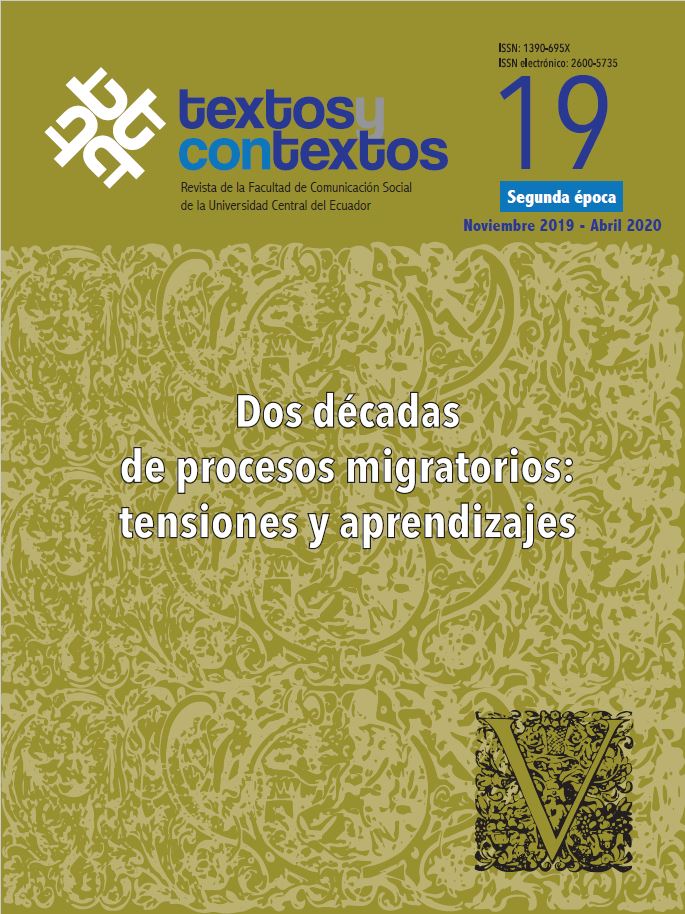Euromaidanistas: acción social de migrantes ucranianos en Varsovia
Contenido principal del artículo
Resumen
Las protestas en la plaza de Maidan (Kiev, Ucrania), en 2014, significaron un cambio cultural respecto de cómo la sociedad y el Estado ucraniano podían ser percibidos por el mundo. Maidan hablaba de una comunidad política basada en valores como los derechos civiles, la democracia, la solidaridad y el estilo de vida occidental representado por la Unión Europea. Este movimiento tuvo un fuerte impacto en los ucranianos que viven en Polonia. Ellos actuaron como grupos formales, informales y como individuos. Este artículo se refiere a las actividades civiles de una fundación de migrantes ucranianos, considerada por las autoridades locales y otras organizaciones no gubernamentales como representante institucional de toda la comunidad ucraniana. Determina el impacto de los migrantes ucranianos en la vida local de Varsovia principalmente en el ámbito de las organizaciones no gubernamentales y en su interacción con otros actores sociales.
Descargas
Métricas
Detalles del artículo
Citas
Appadurai, A. (1996). Modernity at large. Cultural Dimensions of Globalization. University of Minnesota Press, Minneapolis
Baran D. (2016). Wizerunek Ukraińców na łamach wybranej polskiej prasy. Państwo i Społeczeństwo, 16, 97 – 116
Abdelhady D. (2006). Beyond home/host networks: forms of solidarity among Lebanese immigrants in a global era. Identities:
Global Studies in Culture and Power, 13:3, 427 - 453
Boccagni, P., Lafleur, J_M., Levitt, P. (2015). Transnational Politics as Cultural Circulation: Toward a Conceptual Understanding
of Migrant Political Participation on the Move. Mobilities, 1 – 20
Buckley, N., Olearchyk, R. (2013). “Ukraine refuses to sign up to Europe deal”, Financial Times, 29.11.2013,
Ferguson, J. (2005) ”Decomposing modernity: history and hierarchy after development”. In. A. Loomba, S. Kaul, M. Buntzl,
A. Burton, J. Esty (eds.), Postcolonial Studies and Beyond, Duke University Press, Durham and London.
Gerasimov, I. (2014). Ukraine 2014: the first postcolonial revolution. Introduction to the forum. Ab Imperio, 3, 22 – 44
Gielis, R. (2009). A global sense of migrant places: towards a place perspective in the study of migrant transnationalism.
Global Networks, 9:2, 271 – 287
Glick Schiller, N. Fouron, G.E. (1999). Terrains of blood and nation: Haitian transnational social fields. Ethnic and Racial
Studies, 22:2, 340 – 366
Hedenskog, J. (2014). “Ukraine– challenges for the future”. In. N. Granholm, J. Malminen, G. Persson (eds.). A Rude Awakening.
Ramifications of Russian Aggression Towards Ukraine, FOI, Stockholm.
Kordan, B. (2016). “Maidan and the politics of change: meaning, significance, and other questions”. East/West: Journal
of Ukrainian Studies, 3:1, 137 – 153
Levitt, P., Glick Schiller, N. (2014). “Conceptualizing simultaneity: a transnational social field perspective on society”, International
Migration Review, 38:3, 1002 – 1039
Levitt, P. (2001). The Transnational Villagers. University of California Press, Berkeley, Los Angeles and London
----------(2005). “Building bridges: what migration scholarship and cultural sociology have to say to each other”. Poetics,
, 49 – 62
----------(2012). “What’s wrong with migration scholarship? A critique and a way forward”. Identities: Global Studies in Culture
and Power, 1 – 8
Levitt, P., Jaworsky, N. (2007). “Transnational migration studies: past developments and future trends”. Annual Review
of Sociology, 33, 129 – 156
Levitt, P., Lambda-Nieves, D. (2012). “Social remittances revisted”. Journal of Ethnic and Migration Studies, 37:1, 1 – 22
Milczarek, D. (2015). “Polska jako kreator polityki wschodniej Unii Europejskiej”. Studia Europejskie, 4, 27 – 47
Ministerstwo Spraw Zagranicznych (2014). Polska pomoc humanitarna na rzecz Ukrainy w 2014, Warszawa
Peisakhin, L. (2015). “Answering remaining questions about Ukraine’s Maidan protests, one year later”. The Washington
Post, 25.02.2015
Polityuk, P. (2014). “Ukraine passes anti-protest law”, Independent, 17.01.2014
Portes, A., Landolt, P. (2000). “Social capital: promise and pitfalls of its role in development”. Journal of Latin American
Studies, 32:2, 529 – 547
Portnov, A. (2015). “Post-Maidan Europe and the new Ukrainian studies”. Slavic Review, 74:4, 723 – 731
Shveda, Y., Park, J.H. (2016). “Ukraine's revolution of dignity: The dynamics of Euromaidan”. Journal of Euroasian Studies,
:1, 85 – 91
Smith, M. P. (2005).” Transnational Urbanism Revisited. Journal of Ethnic and Migration Studies”, 31:2, 235 – 244
Stępniewski, T. (2016).” The European Union and Eastern Partnership: Crises and Strategic Assessment”. Rocznik Instytutu
Europy Środkowo-Wschodniej, 14:5, 337 – 344
- Staszak, K., Mizuro, M., Cyraniewicz, M., Majewski, P., Litka, P. (2014). Polscy politycy doradzają protestującym
na Majdanie, Rzeczpospolita, 27.01.2014
Vertovec, S. (2012). Transnationalism. Routledge, London and New York




